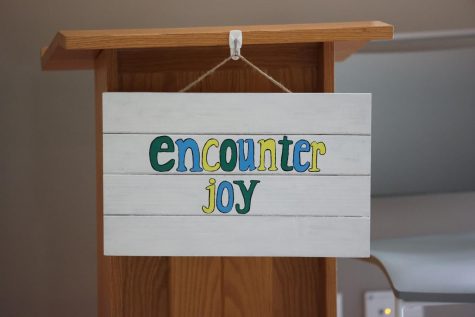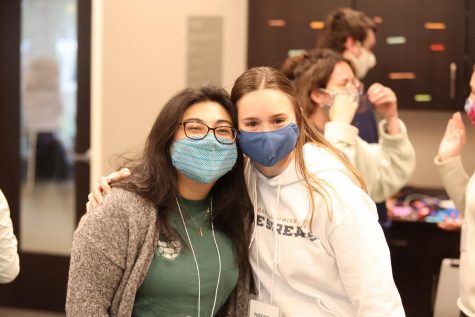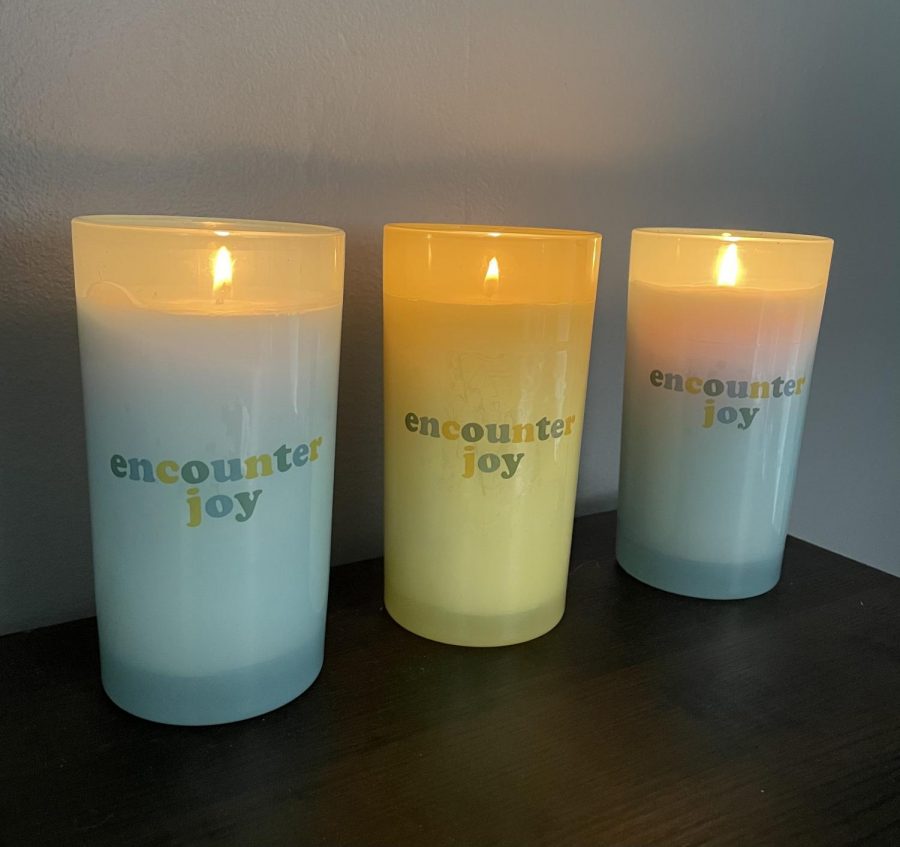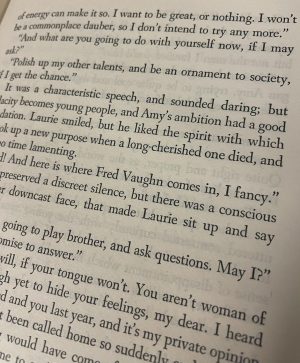My thesis on joy
The Encounter Retreat Team gave these candles to everyone who went on the retreat. (Photo courtesy of Josie Schuman)
Apr 29, 2021
“Joy is different from happiness.”
Jurell Sison, the assistant director of campus ministry at JCU, shared this thought during the Encounter Retreat two weekends ago. He called it his thesis about joy. Deep down, I knew that he was right. There seemed to be some inherent difference between joy and happiness, but I couldn’t pinpoint what it was. I wasn’t convinced. There’s a big difference between knowing something and actually believing it.
“Encountering joy” was the theme of this retreat, which was a brand new Campus Ministry experience. Since Manresa was canceled due to the pandemic, Campus Ministry wanted to have some kind of alternative. And I am so happy (or is it joyful?) that they did.
We spent the weekend wrestling with this idea of joy. The retreat leaders introduced the idea that “joy is gladness not based on circumstance.” Talk after talk, prayer after prayer, people discussed how joy has room for depression, anger, anxiety and despair. Joy could handle it all, people kept saying. But I kept questioning how. How can you be joyful and angry at the same time? It didn’t make sense.
During the prayer service on the first night, the retreat leaders had us journal about pain. I had no problem doing that. Words spewed out of me onto the page. My pen couldn’t keep up with my thoughts. However, when they asked us to journal about joy, my thoughts came to a standstill.
I thought I was a joyful person. Like all of us, I have my baggage, but I am an extremely lucky person who lives a generally happy life. So why then was it so hard to write about joy?
I started grasping at straws, relying on my usual “happy moments” to write about — dancing at a music festival during a complete downpour with my best friends, swimming in the ocean at 2 a.m. during my last night studying abroad in Spain, sitting at my grandma’s dining room table sharing stories with my family. I cherish all these moments dearly, but they didn’t seem right. I felt happy during these instances, sure. But they didn’t stand out to me as joyful.

Again, I was struck by this difference, but I couldn’t articulate what it was. I shared this frustration and confusion with my small group the next day, and one group member offered her perspective on the matter.
She told me a story about her independent study class (an unlikely place to find joy, I thought to myself). She was complaining to her adviser about how stressed she was about her research, and her adviser said she should just drop the class and stop the project. My friend protested and said she couldn’t do that. Her adviser prodded her about why she persisted if the class brought her so much stress and anxiety. She had no response. Her adviser said, “That’s joy.”
Despite the anxiety, stress and sacrifice that came with her independent study class, the work my friend was doing ultimately brought her joy — so she kept going.
I don’t often have “aha” moments, but I had one after hearing this story.
Joy isn’t happiness. Happiness is fleeting. Joy is not.
I instantly thought about my passion for teaching. This semester has been hard on me; student teaching during the pandemic has been physically and emotionally draining. I went through most of the semester teaching to black screens. I asked questions during class without getting responses from anyone. I reviewed the answers to the homework in class, yet no one turned it in. The majority of my students are failing. I called their parents, and they didn’t pick up. But, at the end of the day, I keep getting out of bed to do it all over again.
That’s joy.

Despite these challenges, and there have been many, I still love teaching. I know it’s what I want to do. I love interacting with students and other teachers in whatever capacity I can. I have a fervent passion for the subject material. I learn something new from my students every day.
For me, joy is like passion. It’s a zest for life. Joy is that ever present sense of momentum that keeps pushing me forward. It’s a perpetual, deeply ingrained feeling. I think that’s why it was so hard for me to write about joy during that prayer service. Joy isn’t just a series of those cheesy moments. It’s a fearless will to live and embrace all the pain that comes with being human.
Humans are born with joy: this inherent, powerful force that assures us that it’s all worth it. I know this feeling is not always easy to capture. I’ve had my fair share of forgetting about it, giving way to the pain and suffering that spilled so willingly onto the pages of my journal. However, upon reflection, I feel this joy — this motivation, this energy, this life — so much more strongly than all the pain.
And I think that’s pretty remarkable.













